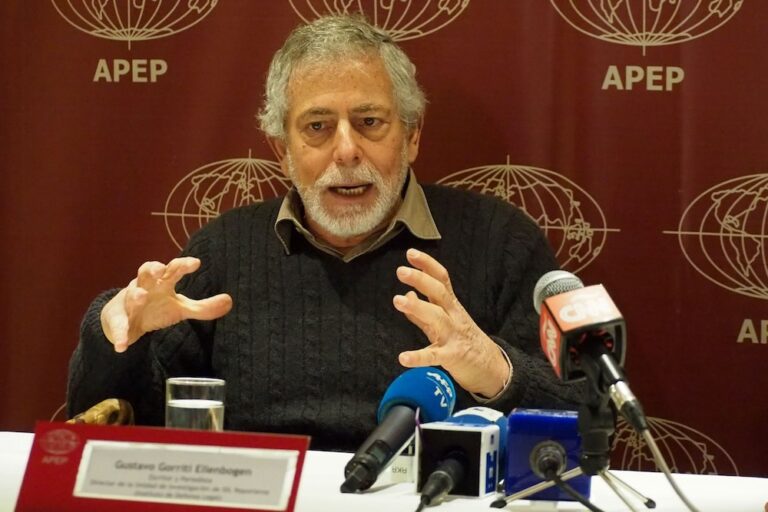The National Democratic Institute for International Affairs (Instituto Democrático Nacional para Asuntos Internacionales, NDI) and the Carter Center, an independent non-governmental organisation which is observing the electoral process in Peru, presented a report stating that “the 2000 electoral campaign has been muddied by a lack of objectivity in the media, and journalists’ tendency toward sensationalism”. […]
The National Democratic Institute for International Affairs (Instituto Democrático Nacional para Asuntos Internacionales, NDI) and the Carter Center, an independent non-governmental organisation which is observing the electoral process in Peru, presented a report stating that “the 2000 electoral campaign has been muddied by a lack of objectivity in the media, and journalists’ tendency toward sensationalism”.
The report further states that “the delegation has observed that, instead of holding a serious debate, many television stations openly demonstrate their bias against, and hostility toward, opposition candidates and electoral observers”.
As well, the report condemned the fact that “a number of opposition candidates have pointed out that there has been a lack of objective coverage of their campaigns and political programmes, nor have they been able to obtain paid publicity slots on widely broadcast stations”. The report was signed by Rodrigo Carazo, Guillermo Márquez, Gerardo Le Chevallier and Shelley McConnell.
The International Federation for Human Rights (Federacion Internacional de Derechos Humanos, FIDH), via the Mexican observer Marie Claire Acosta, has also commented on the subject, noting that “the FIDH commission’s main concern is the lack of access to the media, particularly access to publicity, faced by candidates running against President Alberto Fujimori, as well as the attacks and obstacles these candidates are subject to.”
The Legal Defence Institute (Instituto de Defensa Legal, IDL), has issued a bulletin called “Alert” about the hindrance to freedom of expression in Peru resulting from the fact that Fujimori, president and candidate for re-election, has managed to control those television stations which broadcast to the large majority of Peruvians “without needing to resort to legislation, expropriation, deportations or detentions”.
After these criticisms were received by the government, President of the Council of Ministers Alberto Bustamante Belaunde strongly advised private stations to cover in the most equitable manner possible the various candidates who are participating in the current electoral process. The minister added, however, that “we cannot do anything more than advise, suggest and recommend.”
Recommended Action
Send appeals to the president of the National Electoral Tribunal:
– requesting that, in order to assure that the rights guaranteed by the constitution and the norms governing electoral processes are observed, he ask broadcast television stations to give equal treatment to all presidential candidates so that they can make known and explain their plans for governing, as well as promote their campaigns
Send appeals to the head of the National Electoral Processes Office:
– calling on him to ensure that daily thirty minutes slots in state-controlled media be distributed via a public raffle and thus be made available to candidates, in accordance with the laws surrounding electoral procedures
Send appeals to the president:
– demanding that he not use official publications, television or print media owned by the state to further disseminate direct or indirect political propaganda supporting his candidacy and to ensure that information is disseminated on behalf of the other candidates, such as the law stipulates
Appeals To
APPEALS TO:
Alberto Fujimori Fujimori
President of the Republic
Fax: + 51 14 266 770 / 266 535
Alipio Montes De Oca
President, National Electoral Tribunal
Fax: + 51 14 286 161
Jose Portillo Campbell
Head, National Office of Electoral Processes
Fax: + 51 13 158 080 / 158 059
Please copy appeals to the source if possible.


